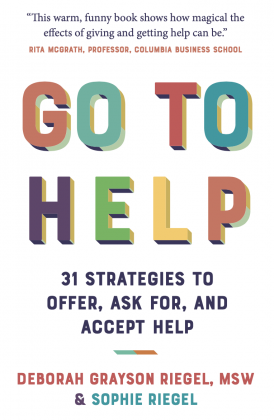Do any of these sound familiar when you think about asking someone for help?
“I don’t want to bother people.”
“If I ask for help, I will look weak.”
“Nobody will do it the way I would do it.”
“Everyone’s dealing with their own stuff, too.”
“I’m afraid there will be strings attached to the help…”
If so, then we want to talk to you (and we would love to you talk to us!)
Who is “us” — and why should we talk?
Well, my daughter Sophie, a junior at Duke University, and I just wrote a book that became an Amazon #1 bestseller!
#1 Amazon Overall Bestseller in Organizational Change
#1 New Release in Business Decision Making
#1 New Release in Workplace Behavior
#1 New Release in Business Mentoring and Coaching
We think this is great news for professionals, parents, and partners who feel like asking for help from friends, family, and colleagues can be embarrassing and/or challenging.
Sophie and I are no exception.
I personally struggled with obsessive-compulsive disorder for decades, avoiding going to see a psychiatrist for years because I didn’t want to take medication. So I told myself, “I can live with this, it’s no big deal.” And yes, I could live with it and did live with it for years. But it wasn’t until my OCD became more difficult to live with than any imagined (or real) side effects of medication that I finally sought the help I needed (and I am thankful every single day that I asked for help.)
But I didn’t ask for help because I was scared of the solution. (This is what’s known as “solution aversion”)
Sophie and I both realized that we had to get better at asking for and accepting help. And if we could learn to do it, others could as well.
In our book, we discuss multiple reasons why people don’t ask for help at work, at school, or from friends and family, including the ones we listed up top.=
And the costs of NOT asking for help are high — we are overworked, our mental health and physical health suffers, we can lose credibility and reputation when our work suffers as a result, and there are relationship costs. If I knew you needed help and that you didn’t ask me, I would feel confused and hurt!
In our book, we teach professionals, parents, and partners:
- That asking for help is a mindset and a skillset that can be learned
- What kind of help isn’t helpful (despite your best intentions)
- How to become “help fluent” so that you have a wide range helpful options to choose from (see the attached postcard for the strategies)
- How to help other people become better at asking for help
- How to help someone who doesn’t want your help
I hope this is as interesting and timely to you as it is to us.









